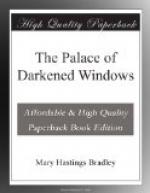“Well you are pretty enough,” she said coolly. “Hamdi has always the good taste. But do you think you will keep my room from me—h’m?”
“I do not want your room,” said Arlee with passionate intensity. “I do not want to stay here. I want only to go away. Oh, there must be a way. Please help me—please.” She choked and broke down, the tears hot in her eyes.
[Illustration: “‘I do not want to stay here’”]
The other girl abruptly drew her down on the couch and settled herself beside her among the cushions. “Here—be comfortable—let us be comfortable and talk,” she said. “Do not cry so—What, you are so soon sorry? You want to be off?”
Desperately Arlee steadied her shaking voice. “I must go at once.”
“You got enough so soon?”
“Enough!” was the quivering echo.
“What you come for then?”
“Come for? I did not know what I was coming into. I thought—but tell me,” she broke off to demand, “tell me about the plague. Was there any quarantine at all? How soon was it over? What is really happening?”
“Quar—quar—what you mean?”
“The plague? Has there been a plague here? Have people had to stay in the palace on account of it?”
“Oh—h!” The indrawn breath was eloquent of enlightenment. “Is that somethings he said to you?”
“Yes, yes. Isn’t it true? Wasn’t there any plague?”
With eyes of dreadful apprehension she saw the other shake her head in vigorous denial. “No plague,” she said decisively. “My maid—she know everything. No sickness here.”
“Then it was all a lie.” Arlee’s eyes fixed themselves on the dancing candle flame, swaying in the soft night air. She tried to think very coolly and collectedly, but her brain felt numb and fogged and heavy. The sight of that tortured candle flame hypnotized her. Faintly she whispered, “Then it was all—an excuse,” and, at that, sharp terror, like a knife, cleaved her numbness. She turned furiously to her visitor.
“But he would not dare make it all up!”
She saw the callousness of the shrug. “Why not—he is the master here!” Her own heart echoed fearfully the words. She stammered, “But—but I wrote—I had a letter—there must——”
“What in all the world are you saying?” demanded the other. “What is this story?” and as Arlee began the quick, whispered narration she listened intently, her little dark head on one side, nodding wisely at intervals.
“So—you came to have tea,” she repeated at the close, in her quaintly inflected, foreign-sounding English. “And you stay because of the plague? So?”
“But I wrote—I wrote to my friends and——”
“And gave him the letters!”
“But I had a letter from my friends—or a telegram rather.” Arlee knitted her brows in furious thought. “And it sounded like her.”
“Does he know her, that friend?” questioned the other and at Arlee’s nod, “Then he could write it himself—that is easy on telegraph paper. He is so clever, that devil, Hamdi.”




